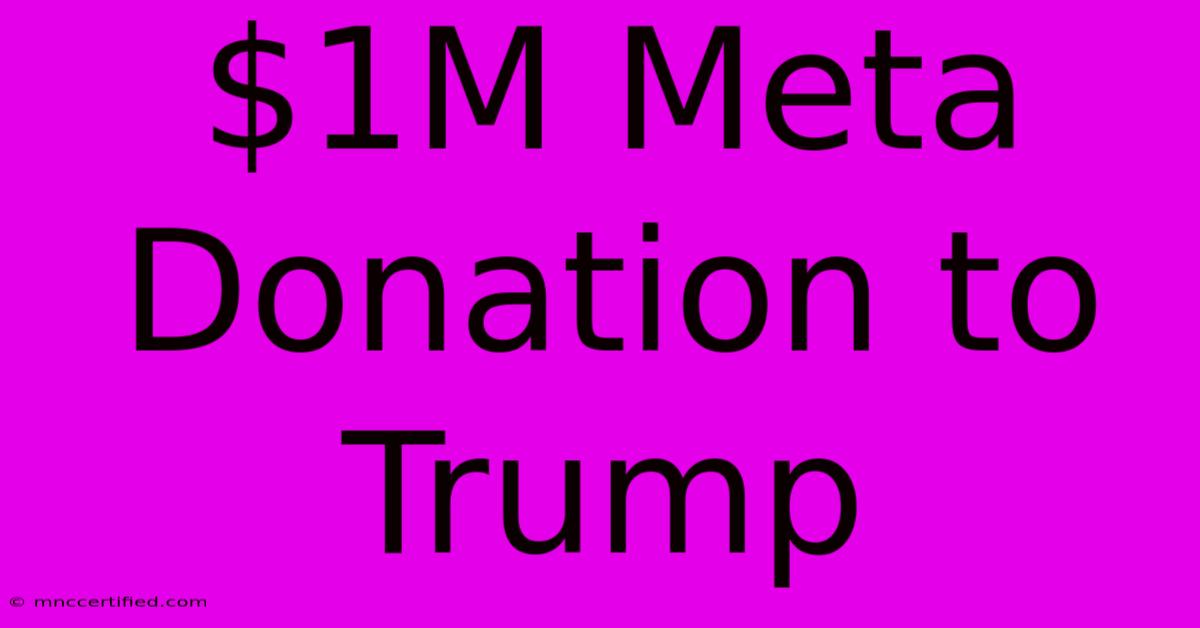$1M Meta Donation To Trump

Table of Contents
Meta's $1 Million Donation to Trump: A Deep Dive into the Controversy
Meta's $1 million donation to a Trump-affiliated Super PAC has ignited a firestorm of controversy, sparking intense debate about the role of big tech in politics and the potential implications for the upcoming election. This article delves into the details of the donation, exploring the reactions, the legal ramifications, and the broader ethical considerations involved.
The Donation: What We Know
On [Insert Date of Donation], Meta, the parent company of Facebook and Instagram, made a significant donation of $1 million to [Name of Super PAC]. This Super PAC is closely aligned with Donald Trump's political efforts, raising concerns about potential influence peddling and the blurring of lines between corporate interests and political campaigns. The donation was publicly reported in [Source of Report], sparking immediate outrage and scrutiny.
Why the Controversy?
The controversy surrounding this donation stems from several key factors:
- Meta's Market Dominance: Meta holds a dominant position in the social media landscape, wielding immense power over information dissemination and public discourse. Critics argue that this power should not be used to influence elections through large-scale political donations.
- Concerns About Bias: Many believe that Meta's algorithms and content moderation policies already exhibit a bias, and this donation further fuels concerns about the platform's objectivity and its impact on public perception of political candidates.
- Transparency Concerns: While the donation was publicly disclosed, questions remain about the transparency of Meta's political spending and the potential for undisclosed influence. The lack of complete transparency raises suspicion and fuels distrust.
- Potential for Quid Pro Quo: The possibility of a quid pro quo arrangement – where the donation is exchanged for favorable treatment or policy decisions – is a major concern. Critics argue that such a scenario would undermine democratic processes.
Reactions and Responses
The reaction to Meta's donation has been overwhelmingly negative, with widespread condemnation from various political commentators, advocacy groups, and even some within the tech industry itself. [Mention Specific Examples of Reactions, including Quotes if possible].
Meta has yet to issue a full and detailed statement addressing the controversy directly. However, [Mention any official statements or responses from Meta]. This lack of a comprehensive response has further fueled speculation and increased public distrust.
Legal and Ethical Implications
The legality of Meta's donation depends on the specifics of campaign finance laws and regulations. While the donation itself may be legal under existing laws, the ethical implications are far more complex. The donation raises serious questions about corporate social responsibility, the potential for undue influence in elections, and the need for stricter regulations governing political donations from large tech companies.
Calls for Reform
The controversy has renewed calls for more stringent regulations on political donations from tech companies. Advocates argue that the current system is inadequate and allows for undue influence by powerful corporations. The debate is likely to intensify in the coming months, potentially leading to significant changes in campaign finance laws.
The Broader Context
Meta's donation is part of a larger trend of increasing political involvement by big tech companies. This trend raises broader questions about the power and influence of these companies in shaping public opinion and influencing electoral outcomes. Understanding this broader context is crucial for analyzing the significance of Meta's donation to Trump.
Conclusion: Moving Forward
Meta's $1 million donation to a Trump-affiliated Super PAC represents a significant event with far-reaching implications. The controversy underscores the urgent need for greater transparency, stricter regulations, and a broader ethical discussion about the role of big tech in political processes. The outcome of this controversy will likely shape future debates about the relationship between technology, politics, and democracy. Further investigation and public discourse are essential to ensure a fair and transparent electoral process.
Keywords: Meta, Facebook, Trump, donation, Super PAC, politics, controversy, campaign finance, election, social media, tech, influence, ethics, regulations, transparency, quid pro quo, legal implications, market dominance, algorithm bias.

Thank you for visiting our website wich cover about $1M Meta Donation To Trump. We hope the information provided has been useful to you. Feel free to contact us if you have any questions or need further assistance. See you next time and dont miss to bookmark.
Featured Posts
-
Game Awards 2024 Astro Bot Triumphs
Dec 13, 2024
-
Rams Vs 49ers Game 3 Winners And Losers
Dec 13, 2024
-
Astro Bot Goty 2024 Winner Announced
Dec 13, 2024
-
Rams Defeat 49ers In Rain Soaked Game
Dec 13, 2024
-
Arrest Of James Kennedy Vanderpump Rules News
Dec 13, 2024